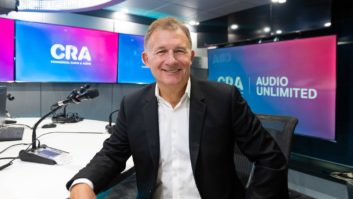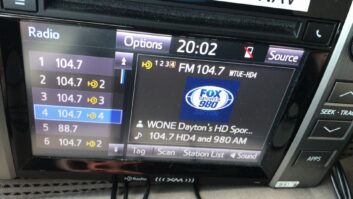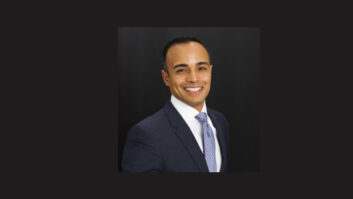NEW YORK It may not yet be the “killer app” that Jeff Smulyan, chief executive officer of Emmis Communications, has predicted it will become; but digital song tagging appears to be gaining a foothold in the United States among the larger radio groups. Whether consumers will follow is still unknown.
Nine major groups committed to song tagging 17 months ago, but some of them are more active than others. Harder to determine is how well tagging is gaining traction among consumers, if at all, since download data often is hidden behind the corporate wall. Broadcasters contacted for this story were reluctant to discuss how many songs they are being credited with, citing confidentiality.
But most observers agree radio is not yet to the point where consumers are widely tagging and downloading songs.
Skewing young
Many broadcast leaders believe song tagging — the technology that allows listeners to “tag” songs they hear over the air, then download and purchase them later — is important for radio’s future, especially as portable audio device ownership among young people skyrockets.
Radio’s efforts to attract younger demographics are viewed as crucial to future success. A recent study by the Kaiser Family Foundation found that approximately 76 percent of 8-to-18-year-olds own an iPod/MP3 player, up from 18 percent in 2004. Meanwhile, in a study commissioned by Microsoft in 2008, 61 percent of respondents said their primary source for discovering new music is radio. So it is easy to understand why song tagging is viewed as important.
Apple and Microsoft believe song tagging will boost download sales through their online shops. Meanwhile, broadcasters using the platform hope to expand the listening experience for their audiences and earn a small commission for each song sold, according to proponents.
Specially equipped analog tuners and HD Radio receivers featuring iPod docks — using the Radio Broadcast Data System and HD Radio, respectively — can tag songs with song identifier metadata, called a Unique File Identifier (UFID) code. (RBDS is a communications protocol standard for embedding small amounts of digital information — for example song title and artist info — in the subcarrier of analog terrestrial FM radio broadcasts. HD Radio carries tagging info as part of its digital data stream.)
Apple and Microsoft use different UFIDs, which are non-compatible. Radio stations can choose to send either Apple or Microsoft UFIDs, or both. Jump2Go, a datacasting technology company that licenses song tagging software to stations, broadcasts unified tagging IDs for iTunes and Microsoft’s Zune MP3 player, according to Jump2Go.
Although the receiver stores no audio, an iPod or MP3 player docked to the specially equipped radio can store the song metadata. When the player later is synced with a PC, the computer’s software can show songs that were tagged and are available for download from the iTunes or Microsoft library.
(click thumbnail)
Broadcast Electronics created a tagging guide for stations. Owners of Apple’s iPod Nano can use its built-in analog FM tuner to tag song info and then download the title once the device is synced to a computer. The Microsoft Zune HD MP3 player offers similar capabilities, and consumers can download tagged songs from the Zune Marketplace immediately in Wi-Fi hotspots.
Radio receiver manufacturers are taking notice of song tagging trends. Multiple tabletop home radio and aftermarket receivers feature HD Radio and RBDS song tagging capability. Ford has said it will offer factory-installed HD Radio receivers with iTunes tagging capabilities this year. In its 2010 buyer’s guide, iBiquity Digital lists six tabletop radios that act as docking systems with iTunes tagging.
The pledge
Clear Channel, Citadel, Beasley, Greater Media, Bonneville, CBS, Emmis, Cox and Entercom signed onto the pledge to roll out song tagging in September 2008. When they made the announcement, they said 450 stations were airing song tags or would be soon.
Emmis’ Smulyan wasn’t the only radio CEO excited about radio song tagging capabilities. Bob Neil, president and CEO of Cox Radio, stated at the time, “The connection between the music discovery radio has always provided and its resulting sales make this interactive radio feature a natural for the radio industry.”
Greater Media President and CEO Peter Smyth added, “This innovative technology is yet another compelling example of how radio is embracing today’s interactive world.”
Of those nine groups, some have now started tagging while others apparently are still preparing to do so. Several, including Citadel and Beasley, declined to comment on their plans because of privacy concerns when contacted for this story by Radio World.
‘Killer app’
Emmis continues to believe in song tagging and is in the process of implementing it in its major markets, according to Paul Brenner, senior vice president and chief technology officer, though he sounds a pragmatic note when discussing it.
“Any technology that directly links our mass-market medium to a more targeted two-way technology is a benefit to listeners, our brands and our industry,” he said. “Based on revenue shares and our experience with our online iTunes tagging business,” he said, the company doesn’t expect a windfall from tagging, but does expect some profit. “Emmis Interactive has been focused on how to marry our existing iTunes technology with our on-air operations.”
Greater Media is one of the groups that aggressively moved to song tagging.
“We do (song tagging) on every Greater Media FM music station and were among the first to use the Jump2Go platform,” said Milford Smith, vice president of radio engineering for Greater Media. The company owns 23 AM and FM radio stations, of which 15 have music formats. But as for consumer reaction, he says his market engineers have heard no feedback about tagging.
Chuck Tweedle, senior vice president at Bonneville, said, “We are currently tagging on all of our music FM analog channels using available bandwidth in the RBDS technology. In addition, we are launching tagging on all of our HD1 music channels during the first quarter this year, including Chicago, Cincinnati, St. Louis, Phoenix and Los Angeles.”
Bonneville has 13 analog FM music stations and two HD Radio simulcast channels tagging; it expects another 11 FM HD channels to add the capability by the end of March. It is working to give its properties “additional stickiness” with listeners, Tweedle said.
“That allows the company’s cross-platform standardized tagging infrastructure on analog and HD1 an opportunity for enhanced revenue streams in different areas as the technology emerges.”
Large and small groups
Clear Channel has embraced the technology, with more than 400 of its radio stations using RBDS and another 350 HD Radio channels for song tagging.
“This has created a big buzz not only across the broadcast community, but also the mobile electronics space. All of our Web sites have tagging capability. We really have a deep integration,” said Jeff Littlejohn, executive vice president for distribution development for Clear Channel. Asked about consumer reaction, though, Littlejohn said he had none to pass on.
One major broadcast group, Cumulus Media, is watching developments but has yet to launch song tagging on any of its radio stations and has no immediate plans to do so. Cumulus is the second largest radio broadcast group in the United States with approximately 350 stations in 68 markets.
“We are looking at options. We look at everything that might enhance our product. Tagging is one of those things, but there are roadblocks,” said Gary Kline, vice president of engineering and IT for Cumulus, especially when a company owns hundreds of stations.
“It would be very expensive for us internally with how we value it,” Kline said. “We’d like to see the fee sharing arrangement tipped a little more in our favor.” Industry analysts peg the commission Apple is paying broadcast partners at close to 5 percent of the price for each download credit.
Several smaller broadcast groups contacted for this story said they are excited about the possibilities associated with song tagging.
Marty Hadfield, corporate engineer for Alpha Broadcasting, said the radio group is about to begin a six-station studio consolidation in Portland, Ore., after which the broadcaster will have RBDS song tagging for that cluster. Alpha is owned by Larry Wilson, co-founder of Citadel Communications. Wilson last year purchased two stations in Portland from Microsoft co-founder Paul Allen and four from CBS. He sold his interest in Citadel Communications in 2001 for $2 billion in cash.
“What a great way to interact with listeners,” Hadfield said of tagging. “The listening public has always sought more information related to what they hear on the air.”
Meanwhile, Lincoln Financial Media, licensee of nine FM stations, is considering tagging, said Barry Thomas, vice president of engineering.
“Some of our formats do not lend themselves to tagging. Specifically, I doubt it would be a huge thing with listeners of our country formatted stations,” he said.
Nonetheless, Thomas, who also is chair of the National Radio Systems Committee subcommittee on RBDS, said he is excited about song tagging and other possibilities with RBDS and RadioText Plus, an enhancement to RBDS text services.
“I love the idea. It connects listeners back with the radio stations and gives broadcasters a way to interact with and establish a relationship with listeners,” Thomas said.













